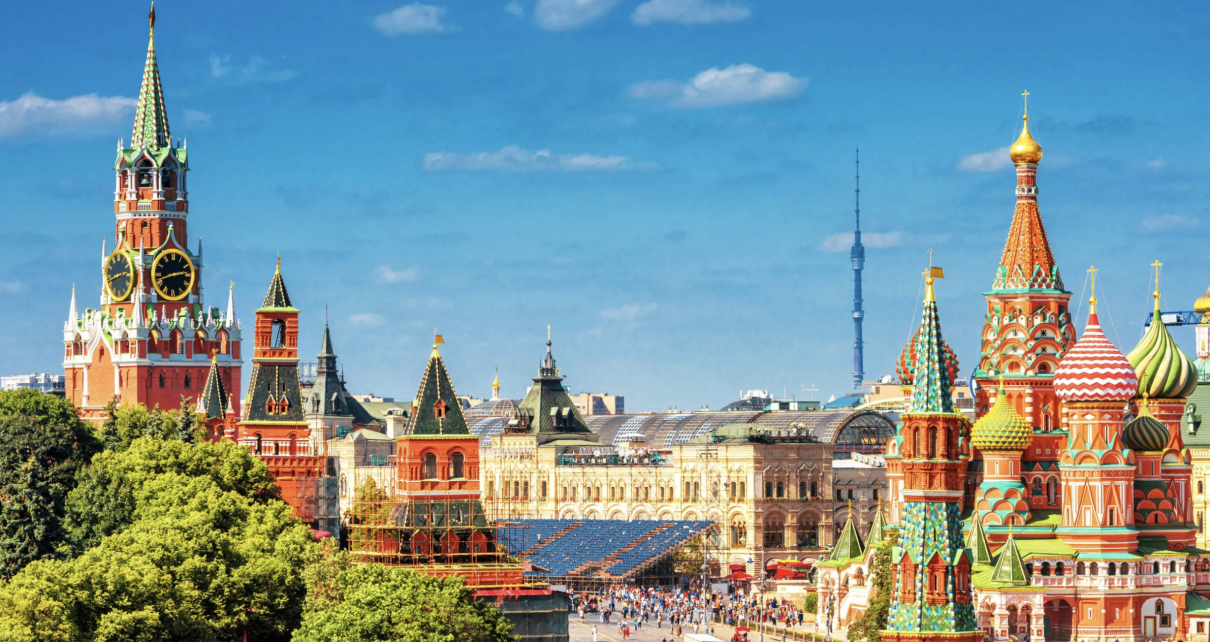
Red Square in Moscow. (Photo: U.S. Department of State)
The Woes of Vladimir Putin: From the BRICS Summit to PMC Wagner
Matters in Russia are more complex and will only become more so within and beyond its borders
By Raghida Dergham, August 28, 2023 2:30 am
Despite his physical absence, Russian President Vladimir Putin was in many ways present at the BRICS summit in Johannesburg, South Africa. Unable to travel there because of an arrest warrant issued by the International Criminal Court in March, over alleged war crimes in Ukraine, Mr Putin was dealt a political, psychological, and personal blow, proving that the plan to isolate the Russian President as part of phasing out Russia from global decision-making is working. The BRICS summit was not the sole source of embarrassment for Vladimir Putin last week either: the explosion of a plane carrying the leaders of the Wagner mercenary group, led by the Kremlin’s old friend, Yevgeny Prigozhin, and commander Dmitry Utkin (nicknamed Wagner, from which the group gets its name), also shone a disparaging light on Russian affairs. While the White House hinted at the Russian President’s involvement in the incident as retaliation for Prigozhin’s rebellion and disobedience, others within Russia pointed the finger abroad, particularly to Ukraine and its allies. Others till in Russian circles highlighted differences between the presidency and the ruling elite, attributing responsibility for Prigozhin’s demise to the latter rather than the former.
Before delving into the ramifications of the deaths of Prigozhin and Utkin on Wagner’s operations in Ukraine and Africa, where the group exerts considerable military, financial, and political influence, let’s start with the BRICS summit beyond Russia’s scope. The main beneficiary of the BRICS’ expansion is China. While still an ally of Russia, China’s ambitions and strategic programs are broader and more geared toward unilateral dominance, especially following Russia’s involvement in the Ukrainian war – a conflict that exposed the fault lines among the founding members of BRICS, including China, India, Brazil, Russia, and South Africa.
The five BRICS nations agreed in the summit to invite six countries that meet certain criteria to join the group, including the Arab nations of Saudi Arabia, the UAE, and Egypt, along with Iran, Argentina, and Ethiopia. India and Brazil opposed the expansion, not towards economically developed countries like Saudi Arabia and the UAE, but the inclusion of economically weaker nations like Iran, Argentina, and Ethiopia that could burden the group. India has different objectives from China within and outside the framework of BRICS. It fears that expanding the membership would diminish the group’s weight, which India does not want to be a vessel for China’s growing influence, power, and leadership. As for Russia, when it hosts the upcoming summit in Kazan, Tatarstan, it intends to propose inviting Venezuela and others into BRICS, a move that will likely stir controversy over the group’s identity and future.
The BRICS group is unlikely to become a cohesive force that could rival the G7, which comprises major industrialized nations with pluralistic and democratic systems of government, namely the United States, Britain, Germany, France, Italy, Canada, Japan, as well as the European Union. BRICS was born out of a nebulous aspiration but has not transformed into an organization with mechanisms or even a headquarters. It is a loose coalition that imposes no political commitments on its members. BRICS is closer to being an economic and political club rather than a coherent organization with binding obligations on its members.
The accession of Saudi Arabia and the United Arab Emirates into the BRICS holds advantages for the group. Indeed, these two nations maintain strong relations with all BRICS members and command substantial investments and presence in global markets. Saudi Arabia is also a major partner to both China and India. However, these two countries are not positioning themselves against the United States or the G7 in the domain of geopolitical competition. Their objective is to contribue to sustainable development, and foster diversified partnerships, rather than exacerbating cleavages within the global economy or entangling themselves in confrontational alignments.
China, whose President Xi Jinping attended the summit, achieved great diplomatic and political success through the expansion of BRICS membership. Yet, China acknowledges that some of the countries joining the BRICS club might not necessarily align with its interests against the United States, especially in the case of the three Arab countries. China further recognizes that BRICS represents a long-term endeavor that, at the present moment, it cannot rival the G7 as a significant bloc. Moreover, it lacks the capacity to evolve into an alternative currency powerhouse to challenge the dominance of the US dollar, irrespective of China’s efforts to that end.
Nevertheless, the BRICS countries wield substantial economic and political power. India is a technological powerhouse, Brazil is an agricultural superpower, Russia is a top producer of energy, and China is a manufacturing giant. While Xi Jinping shone brightly in his participation at the South Africa summit, the conspicuous absence of Vladimir Putin drew considerable attention given both the circumstances behind it and Russia’s waning influence on the international stage. Nonetheless, despite the attention on Putin, the Johannesburg Summit’s was overshadowed by the incident of the Wagner Group plane crash and its implications.
A few weeks prior, US CIA Director William Burns predicted Prigozhin’s demise. “Putin was someone who generally thinks that revenge is a dish best served cold,” Burns said at the Aspen Security Forum. “In my experience, Putin is the ultimate apostle of payback so I would be surprised if Prigozhin escapes further retribution for this,” he added, in reference to Prigozhin’s mutiny in June when he marched his forces towards Moscow.
President Putin extended his condolences to Prigozhin’s family, commending his talent, and noting their longstanding acquaintanceship. A source acquainted with both men since the 1990s, speaking on condition of anonymity, claimed Prigozhin’s actions were never directed against Putin but rather aimed at the Russian military leadership due to their handling of the Ukrainian war. Prigozhin’s intent was to prompt a strategic shift, according to the source who also revealed that Prigozhin had in numerous missions as the enforcer and shadow of Putin, who chose not to be visibly involved, both within and outside Russia, across various domains. The source stressed his belief that President Putin was not responsible for the plane explosion, denying it was an act of retribution against Prigozhin, as implied by Washington.
According to a Russian former official, the “ruling elite,” which extends beyond the military echelon, to include security forces and powerful ministries, are behind the assassination. This group perceived Prigozhin as a threat to the regime following his astonishing mutiny. They viewed him as representing a project that undermines their authority and interests, particularly after he fell outside their control and deviated from the agreed rules of the game.
Prigozhin did not adopt an adversarial stance towards the military leadership. Instead, his demand was for a change in the strategy that Defense Minister Sergei Shoigu and General Valery Gerasimov had embraced. He perceived their strategy as old fashioned and incompatible with the demands of modern warfare or the necessary tactics for a successful “dirty war.” It was his method of expressing opposition that sparked blowback, and his independent leadership that raised the alarm about the transformation of Wagner into an autonomous force and Prigozhin into a decisive national figure with influence on the public opinion that has grown weary of the Ukrainian war and now fears its prolongation.
With Prigozhin’s absence now, the return of Wagner forces to the Ukrainian battlefield has become more feasible. Firstly, Russia needs these irregular forces, particularly if the military opts for extensive destructive operations in Ukrainian cities, actions that could mar the reputation of conventional armies.
Second, in Prigozhin’s absence, President Putin becomes more dependent on the military leadership, as he lacks alternatives without Prigozhin and Utkin. Additionally, the ousting of these key figures from Wagner removes the threat of mounting criticism against the Russian army and certain generals who provided misleading advice to President Putin, thereby contributing to his predicament in the Ukrainian war.
The Wagner phenomenon will not end with the demise of its leaders; rather, it will evolve, despite some anticipation that Prigozhin and senior Wagner officials had formulated a contingency plan in the event of their deaths. The Wagner group will remain active in Africa, Syria, Ukraine, and Belarus, as its operational mechanisms there continue to grind.
We will not definitively know who was responsible for downing the plane that carried the Wagner leadership. Nor will we know if Vladimir Putin was angered or relieved as a result. What we should understand is that it is incorrect to assume that Vladimir Putin has complete control over everything transpiring in Russia, as the West otherwise believes. Matters in Russia are more complex and will only become more so within and beyond its borders, including in both the direct and proxy wars waged by Wagner mercenaries.
- The Woes of Vladimir Putin: From the BRICS Summit to PMC Wagner - August 28, 2023



We are privileged. Can anyone think of a BRICS country they would want to live in.
No, but do you really want to live in a unipolar world? Look what happened over the last few years. It is almost as if the CIA and OGAs send their talking points to AP and Reuters to be auto-rewritten through MSM in Europe, North America, New Zealand, and Australia. One nearly singular narrative inspiring overbearing COVID lockdowns and BLMtifa riots all over. Further expansion of the NWO is not a good idea. As it turns bad there would be nowhere to go, whereas some of BRICS could turn into something better at some point. We need some kind of alternative financial system, languages (English being the primary vector of wokeness), etc.